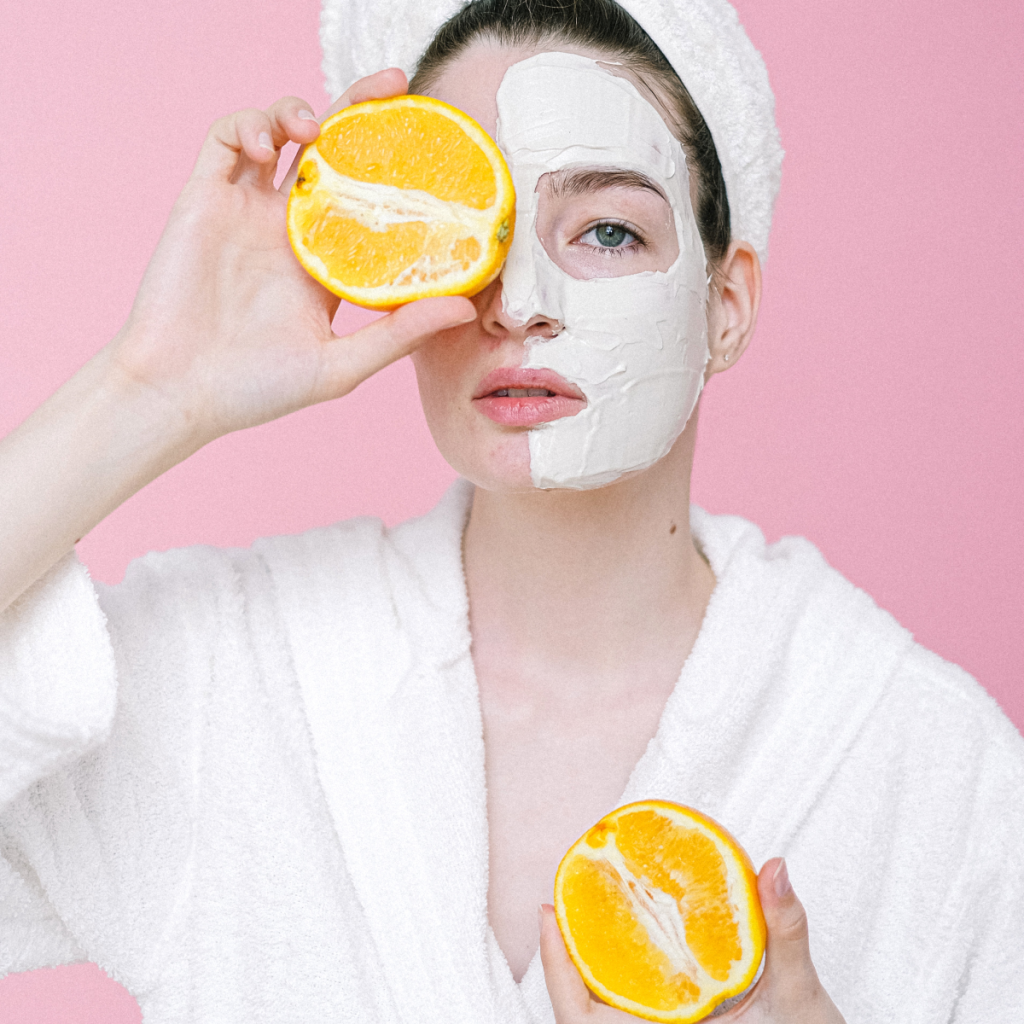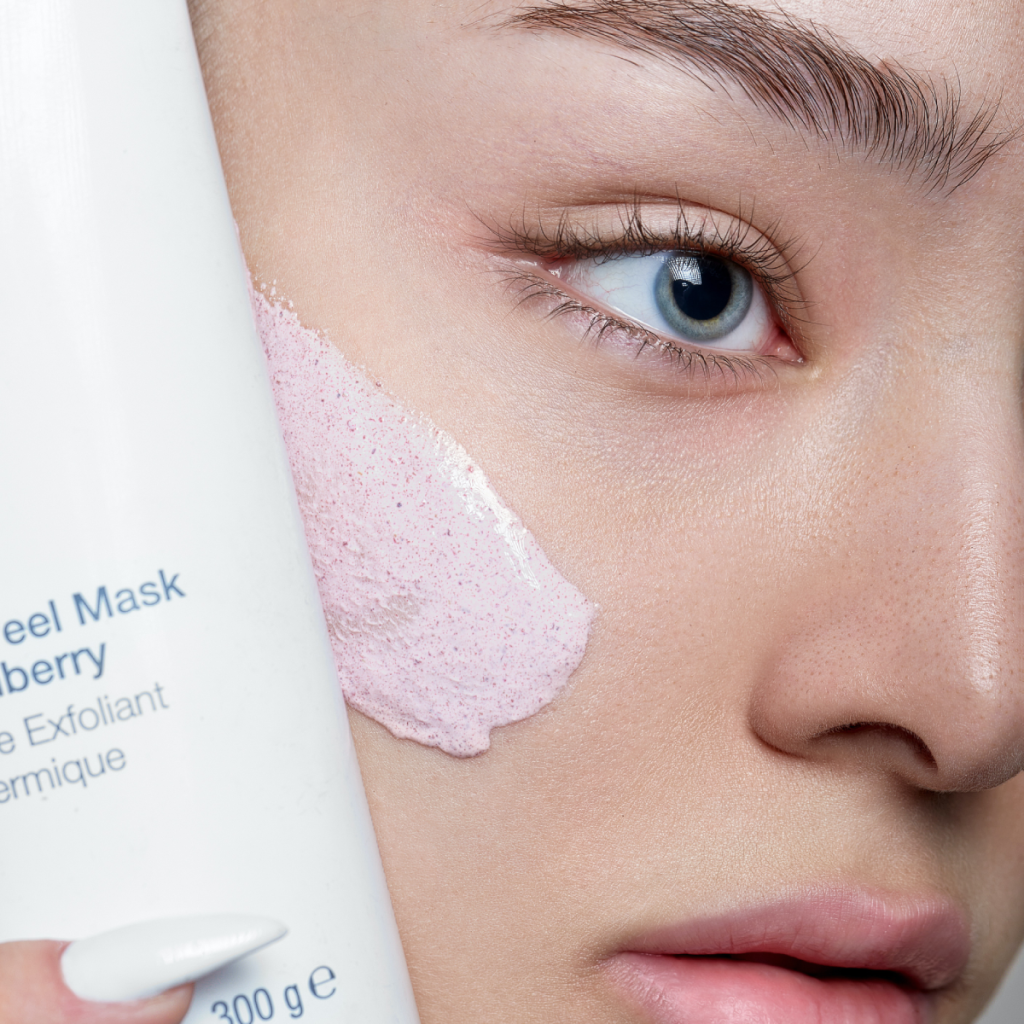Discover the key ingredients to seek out when choosing an exfoliating product.
What Ingredients Should You Look for in an Exfoliating Product?
Exfoliation is like a spa day for your skin. It clears away all the old, dull skin cells and unveils the fresh, radiant skin underneath. But not all exfoliating products are created equal. So, what should you look for when choosing an exfoliating product? Let’s dive in and find out!

Understanding the Role of Exfoliation in Skin Care
Before we dive into the ingredient specifics, let’s take a moment to understand the role of exfoliation in skin care. Exfoliation is the process of removing dead skin cells from the surface of your skin. This not only improves the texture and appearance of your skin but also helps to prevent clogged pores and breakouts.
Exfoliation is a vital step in any skincare routine. Our skin is constantly renewing itself, with new skin cells being produced at the bottom layer and making their way to the surface. However, as these new cells reach the top, they become dead skin cells that need to be removed to make way for fresh, vibrant skin.
The Science Behind Skin Exfoliation
When you exfoliate, you’re essentially helping to speed up the natural shedding process of your skin. By manually or chemically removing the dead skin cells, you reveal the healthy, youthful skin underneath.
Exfoliation not only removes dead skin cells but also stimulates cell turnover. This process promotes collagen production, which is essential for maintaining the elasticity and firmness of the skin. By encouraging cell turnover, exfoliation can also help to fade scars and reduce the appearance of hyperpigmentation.
There are two main types of exfoliation: physical and chemical. Physical exfoliation involves using a scrub or brush to physically remove dead skin cells, while chemical exfoliation involves using acids or enzymes to dissolve the bonds that hold the dead skin cells together.
Benefits of Regular Skin Exfoliation
Regular exfoliation can have a multitude of benefits for your skin. Apart from giving you that post-spa glow, exfoliation can help to:
- Unclog pores and prevent breakouts: By removing dead skin cells and unclogging pores, exfoliation can help to prevent acne and blemishes.
- Improve the effectiveness of other skincare products: When you remove the layer of dead skin cells, your skincare products can penetrate deeper into the skin, making them more effective.
- Even out skin tone and reduce hyperpigmentation: Exfoliation can help to fade dark spots and even out skin tone, giving you a more uniform complexion.
- Minimize the appearance of fine lines and wrinkles: By promoting collagen production and stimulating cell turnover, exfoliation can help to reduce the signs of aging, such as fine lines and wrinkles.
- Enhance the absorption of moisturizers: When you exfoliate, you remove the barrier of dead skin cells that can prevent moisturizers from fully absorbing into the skin. This allows your skin to better absorb and retain moisture.
It’s important to note that while exfoliation can be beneficial, it should be done in moderation. Over-exfoliating or using harsh exfoliants can irritate the skin and cause damage. It’s best to consult with a dermatologist or skincare professional to determine the frequency and type of exfoliation that is suitable for your skin type.
Key Ingredients in Exfoliating Products
Now that we understand the importance of exfoliation, let’s take a closer look at the key ingredients found in exfoliating products.
Exfoliating products are formulated with various ingredients that work together to remove dead skin cells, unclog pores, and reveal a smoother, brighter complexion. Let’s explore some of the most commonly used ingredients:
Alpha Hydroxy Acids (AHAs)
AHAs, such as glycolic acid and lactic acid, are water-soluble acids that work by loosening the bonds between dead skin cells, making them easier to remove. These acids have small molecules that can penetrate the upper layers of the skin, exfoliating and renewing the skin’s surface. AHAs can improve the overall texture and tone of your skin and are great for addressing concerns like dullness and uneven pigmentation.
When using products with AHAs, it’s important to wear sunscreen during the day as these acids can increase your skin’s sensitivity to the sun.
Beta Hydroxy Acids (BHAs)
BHAs, like salicylic acid, are oil-soluble acids that are particularly effective for those with oily and acne-prone skin. These acids have the ability to penetrate deep into the pores, unclogging them and reducing the formation of blackheads and whiteheads. BHAs also have anti-inflammatory properties, making them ideal for soothing redness and irritation associated with acne.
Unlike AHAs, BHAs are not as sensitive to sunlight, making them a suitable choice for daytime use. However, it’s still important to protect your skin with sunscreen.
Retinol
Retinol is a powerhouse ingredient derived from vitamin A. It not only helps to exfoliate the skin but also has numerous anti-aging benefits. Retinol stimulates collagen production, reduces the appearance of fine lines and wrinkles, and improves skin elasticity. It’s best suited for those looking to target signs of aging along with exfoliation.
When using retinol products, it’s essential to start with a lower concentration and gradually increase as your skin adjusts. Additionally, retinol can increase your skin’s sensitivity to the sun, so wearing sunscreen is crucial.
Enzymes
Enzymes are a gentler alternative to acids, making them suitable for sensitive skin types. These natural exfoliants work by breaking down the proteins that hold dead skin cells together. Enzymes like papain (derived from papaya) and bromelain (derived from pineapple) provide gentle exfoliation and also have antioxidant and anti-inflammatory properties.
Enzyme exfoliants are often well-tolerated by sensitive skin and can be used on a regular basis without causing irritation. They offer a milder yet effective way to achieve smoother and brighter skin.
When choosing exfoliating products, it’s important to consider your skin type and specific concerns. Whether you opt for AHAs, BHAs, retinol, or enzymes, incorporating exfoliation into your skincare routine can help you achieve a healthier, more radiant complexion.
How to Choose the Right Exfoliating Product
Now that we’ve covered the key ingredients, let’s talk about how to choose the right exfoliating product for your skin.
Choosing the right exfoliating product can make a world of difference in the health and appearance of your skin. With so many options available, it can be overwhelming to find the perfect one for your specific needs. However, by understanding your skin type and considering your skin concerns, you can narrow down your choices and find the exfoliant that will work best for you.

Identifying Your Skin Type
Understanding your skin type is the first step in finding the perfect exfoliating product. Each skin type has different needs and reacts differently to various ingredients. By identifying your skin type, you can choose an exfoliating product that will effectively remove dead skin cells without causing irritation or dryness.
If you have dry or sensitive skin, you’ll want to opt for a gentler exfoliant, like an enzyme-based product. Enzymes work by breaking down the proteins that hold dead skin cells together, allowing them to be easily sloughed off. This type of exfoliant is less abrasive and won’t strip away the skin’s natural oils, making it ideal for those with dry or sensitive skin.
On the other hand, if you have oily or acne-prone skin, AHAs (alpha hydroxy acids) or BHAs (beta hydroxy acids) would be your best bet. AHAs, such as glycolic acid and lactic acid, work by loosening the bonds between dead skin cells, promoting cell turnover and revealing a brighter complexion. BHAs, like salicylic acid, penetrate deep into the pores, unclogging them and reducing acne-causing bacteria.
Considering Your Skin Concerns
In addition to your skin type, it’s important to consider any specific skin concerns you may have. Exfoliating products can target a range of issues, from hyperpigmentation to aging.
If you’re dealing with hyperpigmentation or sun damage, AHAs can help to fade dark spots and even out your skin tone. These exfoliants work by breaking down the excess melanin that causes discoloration, revealing a more uniform complexion. By incorporating AHAs into your skincare routine, you can gradually reduce the appearance of sun spots and achieve a brighter, more radiant complexion.
For anti-aging benefits, retinol-containing exfoliants are the way to go. Retinol, a derivative of vitamin A, is a powerful ingredient that stimulates collagen production and increases cell turnover. By incorporating a retinol exfoliant into your routine, you can diminish the appearance of fine lines and wrinkles, improve skin texture, and promote a more youthful complexion.
When choosing an exfoliating product, it’s important to read the labels and look for ingredients that will address your specific concerns. Whether you’re looking to combat acne, fade dark spots, or reduce the signs of aging, there is an exfoliant out there that can help you achieve your skincare goals.
Potential Risks and How to Use Exfoliating Products Safely
While exfoliation can do wonders for your skin, it’s important to use exfoliating products safely to avoid any potential risks.
Over-exfoliation: Signs and Solutions
Over-exfoliation can cause redness, irritation, and in severe cases, even damage to the skin barrier. It’s important to pay attention to your skin’s feedback and adjust your exfoliation routine accordingly. If you notice any signs of over-exfoliation, such as increased sensitivity or dryness, scale back on the frequency of exfoliation or switch to a gentler exfoliant.
Safe Usage of Exfoliating Products
To safely incorporate exfoliating products into your skincare routine, follow these tips:
- Start slow: Begin by exfoliating once a week and gradually increase the frequency as your skin adjusts.
- Protect your skin: Always follow exfoliation with a moisturizer and apply sunscreen during the day to protect your freshly exfoliated skin from sun damage.
- Choose the right time: Exfoliate at night, as your skin naturally repairs itself while you sleep.
- Listen to your skin: Pay attention to how your skin reacts to exfoliation and adjust your routine accordingly. If your skin becomes irritated, give it a break from exfoliation.
Recommendations for Top Exfoliating Products
Now that you’re armed with the knowledge of what to look for in an exfoliating product and how to use them safely, let’s explore some of our top recommendations:
Best Exfoliating Products for Dry Skin
- Product A: A gentle enzyme-based exfoliator that nourishes and hydrates dry skin while exfoliating.
- Product B: An AHA-based exfoliant that gently removes dead skin cells and promotes radiance without stripping the skin’s moisture.
Top Exfoliating Products for Oily Skin
- Product C: A BHA-infused exfoliant that unclogs pores, controls excess oil, and reduces the appearance of blackheads.
- Product D: An oil-free exfoliating gel that mattifies the skin, minimizes shine, and leaves you with a fresh, matte finish.
Recommended Exfoliating Products for Sensitive Skin
- Product E: An enzyme-based exfoliating mask that gently removes dead skin cells, calms redness, and soothes sensitive skin.
- Product F: A gentle physical exfoliator with rounded beads that buffs away dead skin cells without causing any irritation.
Remember, the key to finding the right exfoliating product for your skin is to consider your skin type, concerns, and preferences. With the right exfoliant in hand, you’ll be on your way to a smoother, brighter complexion in no time!





